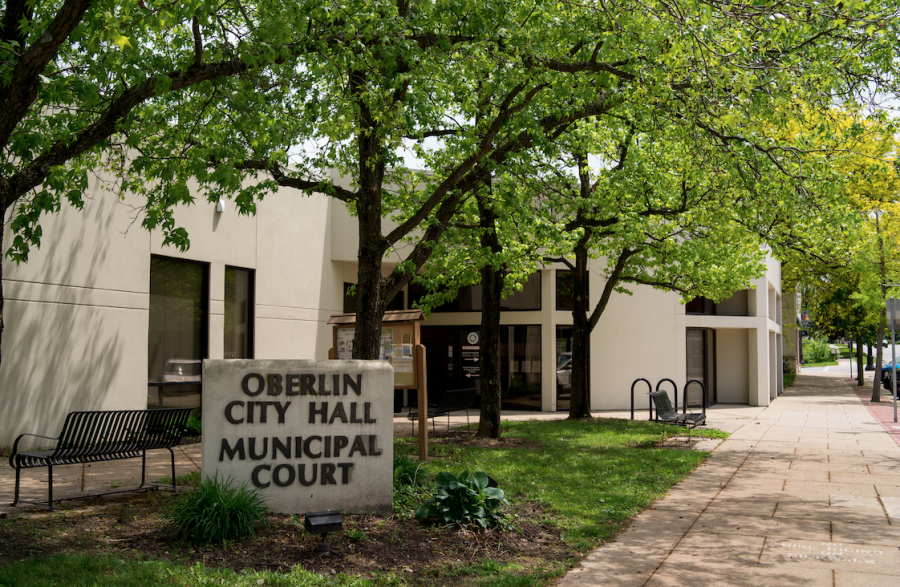City Council Censures Ray English, Welcomes New Member
Last week, City Councilmember Ray English was censured for a breach in confidentiality that occurred during an email exchange.
At last Monday’s City Council meeting, Councilmember Ray English read a statement in response to his recent censuring. The censure, the first time City Council has taken this action in 15 years, was a response to an alleged breach in confidentiality during an email exchange between English and Jon Clark, the city’s law director. Seperate from the censure, the City Council appointed Michael McFarlin as the newest member of Council on Monday to replace Heather Adelman, former councilmember and president, who resigned from her position to join Oberlin College as a sustainability manager.
“The point of the [email] exchange was to point out something that Mr. Clark had done wrong,” said Bryan Burgess, president of the City Council. “Rather than handling that discreetly, Mr. English copied councilmembers and other City staff. Ultimately in the exchange, he reprimanded Mr. Clark for something that had been mentioned in the Council’s executive session just a few nights before.”
Three categories of meetings fall under Oberlin City Council’s executive sessions: employees, litigation, and real estate. The Council believes that English’s emails betrayed the confidentiality of an executive meeting where the Council discussed an annual evaluation of Clark. Although there are no ramifications to censuring and it is largely symbolic, English defended his perspective in his statement to the Council last Monday.
“I want to say first that I made a mistake,” English said in his statement. “The mistake involved not thinking carefully about an email message that I was about to write and its potential consequences. [This is] a classic case of cascading misunderstandings that result from a poorly communicated email.”
English cast the sole vote against the censuring. All other Council members agreed that English had broken confidentiality regarding an executive meeting held April 11. Although he admitted to his mistake and committed to not making the same error in the future, he also addressed what he believed to be incorrect or unfair in the Council’s decision to censure him. English also pointed to a lack of clarity in policy about how and when councilmembers can speak or share information.
“I believe there is ample evidence indicating that the City Council process leading to the censure resolution was unfair and that the censure resolution itself contained statements that were simply false or that pertained matters where Council policy is unclear,” English said in his statement.
According to Burgess, the situation has been resolved, but if the Council decides it necessary, it can take further steps. In his concluding statement for the resolution of the censure, which took place May 16, English questioned if the Council violated the open meetings law by making decisions in closed discussion that excluded him. He also asked whether or not the Council president exceeded the authority that the position has under Oberlin’s charter.
“I have indicated that I believe any further action on this matter — including the possibility of rescinding the resolution — is up to the five members of Council who voted for it,” English said. “That question is beyond my control. I will remain focused on moving forward in a cooperative way to address the challenges facing our city.”
The Council looks to move forward from this situation, as the Tuesday meeting was the last in relation to this censure. Burgess believes that this situation stresses the Council’s expectations for confidentiality in executive sessions.
“The Council speaks as one voice,” Burgess said. “So in an open public meeting, everyone speaks their mind. They represent different constituencies, that’s fully expected, but for the three areas — employees, litigation, and real estate — we speak as one. It would be inappropriate for any one member to voice their opinion.”
Both English and the Council will continue their duties while welcoming a new member, McFarlin. Adelman’s departure left a space open for a new president as well as a new member. Bryan Burgess was elected as president, and McFarlin will take Adelman’s open seat.
“I’m really looking forward to [McFarlin joining the Council],” Burgess said. “He has a lot of experience in the city. He’s been the chairman of the historic preservation commission, and he worked on the city’s comprehensive plan. I expect that he’ll be able to step into the role and get up to speed pretty quickly.”
McFarlin is as optimistic as Burgess regarding his new position on the Council. He is confident that he will be able to catch up quickly due to his experience on other boards and committees.
“I’m looking forward to working with the other members and hearing from the public about what the issues are,” McFarlin said. “There’s always a touch of anxiety going into a new organization, especially something like this … but I feel comfortable with the procedure. … I’m certainly honored to be chosen, — all my thanks to the other councilmembers — and I’m ready to get started.”







